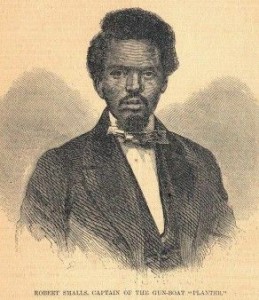Today, United States hero and Baptist layman Robert Smalls is sent to New York on a speaking tour to raise support for the Union cause. Smalls, a former Southern slave, became the toast of the North when, four months earlier, he captured the Confederate gunboat Planter in Charleston, South Carolina, the heart of the Confederacy. At a time when African slaves were escaping from bondage by the thousands, Small’s high-profile and daring escape highlighted the falsity of white Confederate slaveholders’ assertion that Africans were happiest in bondage. In addition, Smalls’ heroism and celebrity status had, in the weeks prior, opened the way for the former slave and his friends to successfully petition U.S. President Abraham Lincoln to allow the recruitment of 5000 black troops to serve in the Union Army.
Now, Robert accompanies wife Hannah and infant son Robert, Jr. from their home in Union-controlled Beaufort, South Carolina to New York, where in the coming weeks he is welcomed by large crowds. For his service to the United States, Smalls is presented by “the colored citizens of New York” with an engraved gold medal honoring his heroism, patriotism and love of liberty. In the months and years following, Smalls serves with distinction in the United States Army and Navy and, after the war, serves for many years as a South Carolina and then a United States congressman.
A member of the First African Baptist Church in Beaufort, formed in 1861 by free blacks during Union occupation of the city, Robert Smalls is perhaps America’s best-known African Baptist layman during the war years and Reconstruction. Upon his death, he is buried in the cemetery of the nearby Tabernacle Baptist Church of Beaufort, a congregation also formed by freed blacks during Union occupation. Smalls’ funeral is said to have been the largest ever in the city. Later, a statue of Smalls is placed atop his grave.
Sources: Robert Smalls timeline (link); Robert Smalls official website (link); “Chely the Beaufort Bear Meets Robert Smalls” (link)



